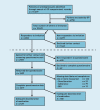Prevalence of treatment-resistant depression in primary care: cross-sectional data
- PMID: 24351501
- PMCID: PMC3839394
- DOI: 10.3399/bjgp13X675430
Prevalence of treatment-resistant depression in primary care: cross-sectional data
Abstract
Background: Antidepressants are often the first-line treatment for depression in primary care. However, not all patients respond to medication after an adequate dose and duration of treatment. Currently, there are no estimates of the prevalence of treatment-resistant depression (TRD) from UK primary care.
Aim: To estimate the prevalence of TRD in UK primary care. Design and setting Data were collected as part of a multicentre randomised controlled trial, from 73 general practices in UK primary care.
Method: Potential participants (aged 18-75 years who had received repeated prescriptions for antidepressants) were identified from general practice records. Those who agreed to be contacted were mailed a questionnaire that included questions on depressive symptoms (Beck Depression Inventory [BDI-II]), and adherence to antidepressants. Those who scored ≥14 on the BDI-II and had taken antidepressants for at least 6 weeks at an adequate dose were defined as treatment resistant.
Results: A total of 2439 patients completed the questionnaire (84% of those who agreed to be contacted), of whom 2129 had been prescribed an adequate dose of antidepressants for at least 6 weeks. Seventy-seven per cent (95% CI = 75% to 79%) had a BDI score of ≥14. Fifty-five per cent (95% CI = 53% to 58%) (n = 1177) met the study's definition of TRD, of whom 67% had taken their antidepressants for more than 12 months.
Conclusion: The high prevalence of TRD is an important challenge facing clinicians in UK primary care. A more proactive approach to managing this patient population is required to improve outcome.
Figures
References
-
- Singleton N, Bumpstead R, O’Brien M, Lee A, Meltzer H. Psychiatric morbidity among adults living in private households, 2000 (Reprinted from Psychiatric morbidity among adults living in private households, 2000: Summary report, 2001) Int Rev Psych. 2003;15(1–2):65–73. - PubMed
-
- Health and Social Care Information Centre (Prescribing and Primary Care Services) Prescriptions Dispensed in the Community: Statistics for England — 2001 to 2011. http://www.hscic.gov.uk/catalogue/PUB06941 (accessed 4 Nov 2013)
-
- National Services Scotland. Information Services Division. Prescribing & Medicines: Medicines for Mental Health — Financial Years 2002/03 to 2011/12. 2012. https://isdscotland.scot.nhs.uk/Health-Topics/Prescribing-and-Medicines/... (accessed 12 Nov 2013)
-
- Trivedi MH, Fava M, Wisniewski SR, et al. Medication augmentation after the failure of SSRIs for depression. N Engl J Med. 2006;354(12):1243–1252. - PubMed
-
- Berlim MT, Turecki G. What is the meaning of treatment resistant/refractory major depression (TRD)? A systematic review of current randomized trials. Eur Neuropsychopharmacol. 2007;17(11):696–707. - PubMed
Publication types
MeSH terms
Substances
Grants and funding
LinkOut - more resources
Full Text Sources
Other Literature Sources
Medical
Miscellaneous

